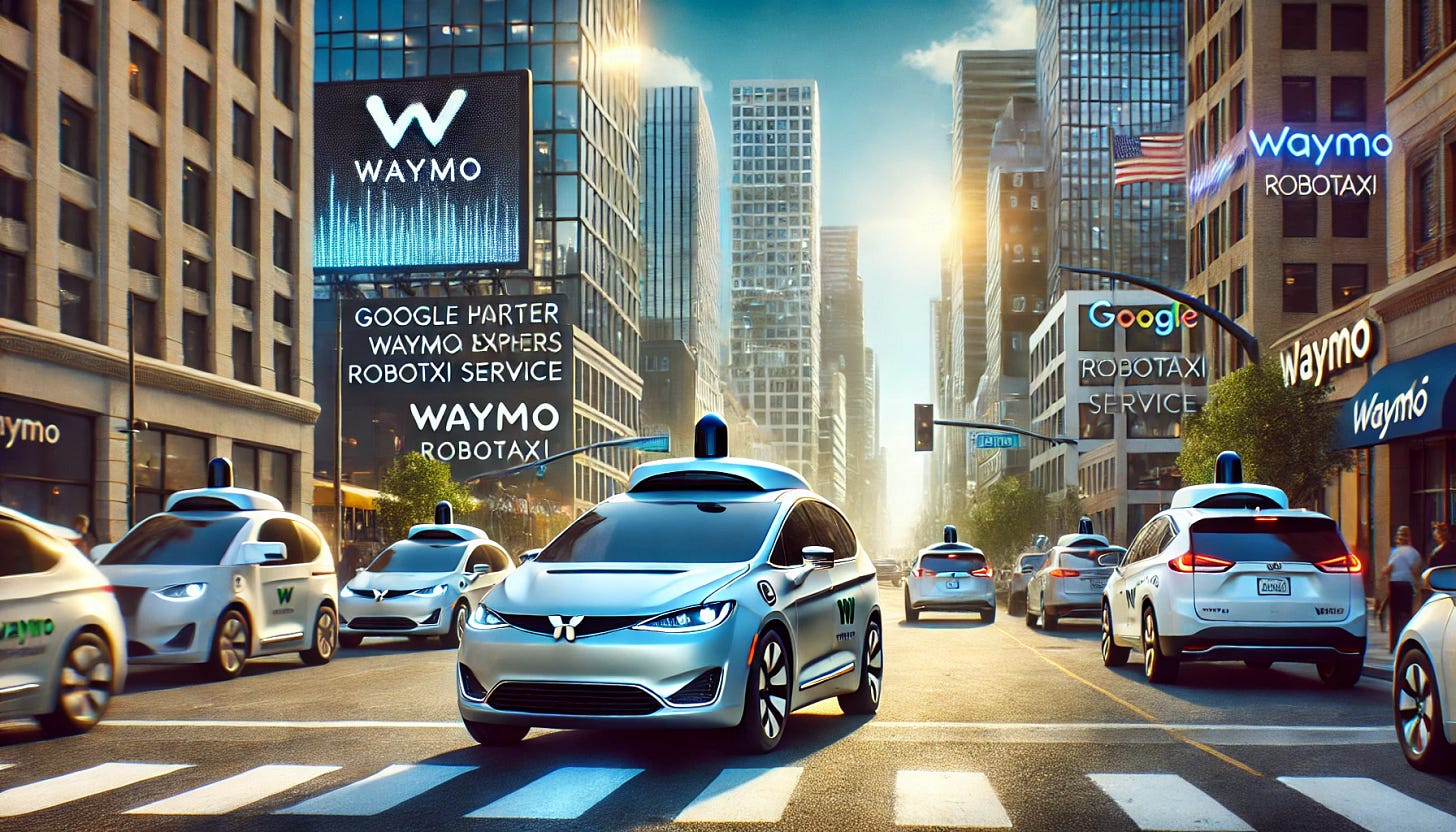Google Parent's Waymo Secures $5.6 Billion to Fuel U.S. Robotaxi Expansion
Alphabet's Waymo Secures $5.6 Billion Equity Infusion
Alphabet’s self-driving vehicle subsidiary, Waymo, has secured $5.6 billion in Series C funding to scale its robotaxi operations across the U.S. This latest financial commitment underscores the escalating competition in the autonomous vehicle (AV) sector as companies vie to dominate the American market. With this recent funding round, Waymo aims to extend its reach and advance its autonomous driving technology, solidifying its position as a leader in the industry.
Background and Investment Details
Waymo's Series C funding was primarily led by its parent company, Alphabet, with notable contributions from previous investors such as Andreessen Horowitz, Fidelity, Perry Creek, Silver Lake, Tiger Global, and T. Rowe Price. The funding brings Waymo’s total capital raised to over $11 billion, following earlier rounds that saw $3.2 billion and $2.5 billion, respectively. This significant inflow comes shortly after Alphabet CFO Ruth Porat announced in July a commitment of up to $5 billion over several years to support Waymo’s long-term growth.
Funding Allocation: Expansion and Technological Advancements
Waymo’s co-CEOs Tekedra Mawakana and Dmitri Dolgov highlighted that this new $5.6 billion investment will drive both the expansion of its Waymo One ride-hailing service and the enhancement of its autonomous technology. Currently active in Los Angeles, San Francisco, and Phoenix, Waymo is poised to broaden its reach with upcoming launches in Austin, Texas, and Atlanta, Georgia, through a new partnership with Uber, bringing driverless rides to a wider U.S. audience.
Our Honorary Tech Adviser, Bilawal Sidhu, based in Austin, shared his anticipation for Waymo’s local rollout. "I'm still on the waitlist despite my status as an ex-Googler," Sidhu remarked, expressing his eagerness to experience the service firsthand.

Safety and Convenience Drive Adoption Among Key Groups
Waymo’s robotaxi service has gained traction among individuals prioritising safety, notably women who feel more secure opting for autonomous rides over those with unknown human drivers. Parents, too, have embraced the service as a reliable transport option, using Waymo’s robotaxis to send their teens to school or extracurricular activities, especially when other transit choices seem less safe or convenient. The predictable, data-driven safety protocols of autonomous vehicles provide reassurance, making Waymo an appealing alternative for those seeking dependable and secure transportation solutions in urban areas.
Tesla’s Entry: A Mounting Challenge?
Earlier, on October 10, 2024, during the "We, Robot" event at Warner Bros. Studios in Burbank, California, Elon Musk unveiled Tesla's highly anticipated Cybercab, a purpose-built robotaxi aimed at fully autonomous, affordable urban transport. Despite an hour's delay due to a medical emergency, Musk’s reveal of the Cybercab as Tesla’s entry into driverless ride-hailing sparked significant excitement. Expected to launch in Texas and California as soon as next year, the Cybercab represents a direct challenge to Waymo’s dominance. While Tesla’s brand power and loyal following may draw riders, experts highlight substantial regulatory and technical hurdles Tesla must overcome, as its existing fleet still operates with partial automation, unlike Waymo’s commercially proven service active across multiple U.S. cities. With years of data and regulatory approvals, Waymo’s infrastructure remains robust, positioning it to retain a competitive edge even as Tesla’s ambitious plans unfold1.
Partnering with Uber: A Data-Driven Advantage
Waymo is partnering with Uber in Austin, Texas, to leverage Uber’s extensive technology and data infrastructure, recognising the immense value of Uber's journey data, which spans billions of rides completed with human drivers. GM Cruise is also set to use Uber's data, tapping into nuanced insights into urban traffic patterns, rider behaviour, and demand fluctuations. These partnerships provide Waymo and Cruise with invaluable support as they scale their autonomous fleets, aiming to deliver seamless and efficient robotaxi services in complex urban settings.
Competitive Landscape and Market Position
The autonomous vehicle industry is advancing rapidly, with numerous contenders vying to establish commercial robotaxi services. Tesla’s recent Cybercab launch has intensified interest, positioning it as one of the most closely observed entrants in the space. Previously, GM's Cruise was Waymo's primary competitor, though its operations were halted following a safety incident. Despite the growing field, Waymo maintains its first-mover advantage as the only autonomous vehicle company with an established, commercially operating robotaxi service across multiple major U.S. cities, setting it apart in a highly competitive market.
Demand for Safety and Convenience
Waymo’s services have attracted individuals who prefer driverless rides due to safety concerns, particularly women and parents seeking secure and convenient transit options for their teens. Waymo currently completes over 100,000 weekly rides across its operational cities, allowing passengers to hail its AVs via the Waymo One app. According to the company, its self-driving vehicles are statistically safer than human-driven taxis, reporting fewer accidents per mile driven. This data-driven focus on safety is expected to strengthen consumer confidence as the AV industry matures.
Safety Incidents and Technological Challenges
While Waymo’s technology boasts a strong safety record, incidents have highlighted challenges facing the AV sector. Reports have documented occurrences where Waymo’s vehicles have unintentionally blocked traffic or traveled incorrectly. Though no serious injuries have occurred, Waymo has undertaken multiple software updates to enhance safety and address these issues. Waymo’s leadership emphasises continuous improvement, noting that technological precision is essential to gaining public trust.
Partnerships and Technological Enhancements
Waymo has strategically partnered with various automakers, recently inking a multiyear partnership with Hyundai to include the Ioniq 5 in its fleet. The latest-generation Waymo robotaxi, built in collaboration with Chinese automaker Geely, integrates advanced custom sensors and AI capabilities, marking a leap in autonomous technology. Furthermore, Waymo has committed to testing its AVs in challenging winter conditions across northern regions, such as upstate New York and Michigan, with plans to expand internationally.
Public Perception and Market Outlook
Despite the technological advancements, public sentiment remains mixed. A Pew Research Center survey reveals that nearly two-thirds of Americans would prefer not to ride in a driverless car. Overcoming these reservations is essential for the broader adoption of AV services. In response, Waymo is actively working on initiatives to improve user experience and safety standards, which may alleviate concerns and enhance market acceptance over time.
Summing Up
With the recent $5.6 billion funding boost, Waymo stands poised to reinforce its leadership in the U.S. robotaxi market. By addressing public safety concerns, expanding into new cities, and refining its autonomous technology, Waymo aims to accelerate the adoption of driverless vehicles. As the company moves forward, its approach will likely set a benchmark for industry standards and define the trajectory for autonomous vehicles in the coming years. Tesla’s anticipated entry into the market could heighten competition, but Waymo’s established operations and technological edge provide a strong foundation to maintain its lead.
Elon Musk Unveils Tesla's Futuristic Fully Autonomous Driverless "Cybercab"
Unveiling of the Cybercab: The Future is Here





